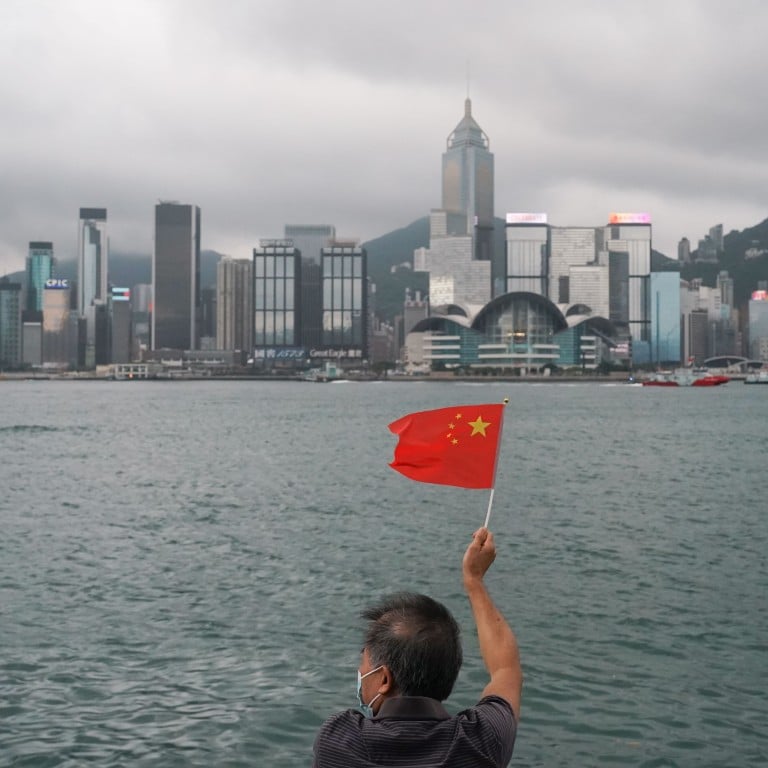
Hong Kong’s role in opening China’s economy to the world ‘not replaceable’, key Beijing official assures investors
- But city must also be more proactive in integrating with the mainland’s development, HKMAO’s Huang Liuquan tells group of business leaders
- The Tuesday summit is part of a multi-day blitz by Chinese officials and experts intended to lay out city’s role in the country’s latest five-year plan
Huang Liuquan, a deputy director of the State Council’s Hong Kong and Macau Affairs Office who is in town to promote China’s 14th five-year plan, also urged the city to be more proactive in both assisting and integrating with the country’s development.
At a Tuesday summit co-organised by the Hong Kong Chinese Enterprises Association and the Hong Kong Trade Development Council, Huang noted there were still concerns among investors about the city’s business development and its participation in national policies amid what he called a “rather complicated external environment”.

He reiterated China’s determination to continue to open its economy despite the rise of unilateralism and protectionism around the world.
“Hong Kong’s status and function in the country’s reform and opening up are very special. It has made a huge contribution, and its role is not replaceable,” Huang told the audience. “The city’s role in the country’s reform will not be weakened, but only be strengthened.”
Huang also argued that the imposition of the national security law last June, which touched a nerve with some business chambers and prompted the United States to slap sanctions on Chinese officials, had actually made Hong Kong’s business environment more stable and better protected citizens’ rights and freedoms.
This year’s United Nations world investment report, which ranked Hong Kong as the third top economy for foreign direct investment, had reaffirmed the city’s status as an international financial centre, he said, something that should reassure investors about the city’s future.
“The central government’s support to maintain Hong Kong’s status as a free port and a separate customs territory … and the policies to protect the legal rights of investors in Hong Kong will not be changed,” Huang said.
Hong Kong must make up for lost time on economic development: Beijing official
He also urged both Hong Kong and Macau, China’s two special administrative regions, to be more proactive in assisting the country’s opening-up process, integrating with its development blueprint and easing communication with foreigners.
The Bank of East Asia’s co-chief executive, Brian Li Man-bun, who was also at the forum, said his bank had recruited 300 frontline staff in the bay area in preparation for the launch of more cross-border investment tools.
Financial Secretary Paul Chan Mo-po, meanwhile, said the nation’s latest five-year plan had made Hong Kong’s role in China’s development much clearer, and the bay area plan offered the best way to seize opportunities brought by “dual circulation”, a national drive to prioritise domestic markets and home-grown innovation amid global economic instability.
Lam administration praised for ‘stabilising’ society, efforts to solve deep-rooted problems
“[The five-year plan] provides the best pathway for Hong Kong to integrate into national development,” he said. “Hong Kong will deepen and expand access with the mainland financial markets, and make better use of our own advantages.”
Huang’s high-level delegation of Beijing officials and financial experts is expected to remain in the city until Wednesday, when they are slated to meet local youth groups.
The delegation, which also includes representatives of the National Development and Reform Commission, as well as the Ministry of Science and Technology, held two separate sessions on Monday briefing government officials and lawmakers on the five-year plan.

Under China’s 14th five-year plan, officially adopted in March, Beijing had vowed to support the city in reinforcing its status as an international financial, shipping, trading and legal services centre. It also pledged to encourage the city in developing new roles, such as becoming an international aviation and technological hub, as well as a hub for intellectual property trading and arts and cultural exchange.
Separately, at a media briefing on Tuesday, Chief Executive Carrie Lam Cheng Yuet-ngor said her administration would be proactive in fully implementing the national plan, and had submitted policy papers to the central government regarding most of those areas.
She added that she had visited the city’s eight government-funded universities and met arts and cultural groups to discuss how to leverage support provided by Beijing.
“I will further explain the relevant work in the 2021 policy address,” she said, referring to the government’s annual strategy blueprint, set to be announced in October.
Additional reporting by Tony Cheung


